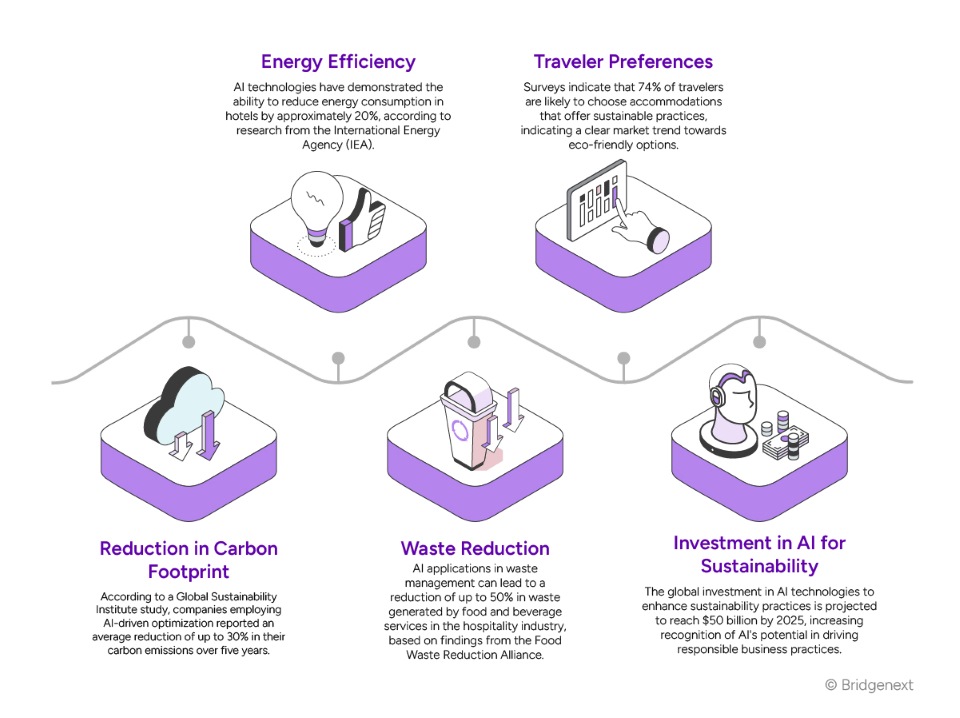10.16.24 By Bridgenext Think Tank

Many businesses already use AI for predictive analytics and automation, but there are still unexplored opportunities for transformation. For example, companies are beginning to explore how AI can better understand and respond to human emotions, potentially leading to improved customer interactions and personalized marketing. Additionally, AI solutions can potentially create highly personalized experiences by analyzing large consumer preferences and behavior datasets. As these advancements progress, businesses will have the chance to redefine customer relationships and foster brand loyalty in new ways.
Similarly, AI will revolutionize sustainability practices in the Travel and Hospitality industry in the next five years by moving beyond common reactive measures. Today, many companies utilize traditional methods, such as manual resource tracking and basic environmental reporting, often leading to inefficiencies and missed opportunities for improvement. However, with advanced AI implementation, the focus will shift to proactive sustainability management.
AI for sustainable development will facilitate more granular data collection and analysis, enabling real-time monitoring of resource usage, energy consumption, and waste generation. For example, hotels will implement AI-driven energy management systems that analyze historical data to optimize energy consumption more precisely than existing practices. This predictive capability stands to curtail operational costs and minimize their ecological footprint.
Additionally, the travel experience will substantially transform as AI will allow smart travel planning that aligns customer preferences with sustainability goals. Current efforts often rely on general information about eco-friendly options, but AI can provide tailored recommendations based on individual travel habits and sustainability ratings of accommodations and activities. This level of personalization will encourage travelers to make greener choices, shifting the industry towards a more sustainable paradigm.
Overall, in the next five years, adopting AI solutions will represent a substantial upgrade from the reactive approaches used today, driving the travel and hospitality industry toward a future where sustainability is integrated into every facet of operations and customer experience.

In the coming years, AI and sustainability are among many emerging trends set to revolutionize the Travel and Hospitality industry and push the boundaries of traditional approaches.
One notable trend is the advent of AI-driven Circular Economy Models, which promote ecycling and facilitate product life extension and resource recovery. By utilizing AI algorithms to track material flows and optimize product lifecycles, companies can reduce waste and enhance resource efficiency, paving the way for a sustainable economic model.
In Practice: Leading hotel chains like Marriott utilize AI-driven circular economy models to transform waste management practices. By implementing AI algorithms, these hotels can track and optimize the lifecycle of products and materials, reducing waste and enhancing recycling efforts. This approach minimizes ecological footprints and lowers operational costs, showcasing how sustainability and profitability can be achieved simultaneously in the industry.
Integrating Personalized AI Sustainability Advisors could revolutionize individual and corporate behavior toward conservation. These AI solutions could analyze personal consumption patterns and suggest recommendations encouraging sustainable choices, from energy conservation in homes to eco-friendly travel options. This trend would foster a deeper individual commitment to environmental responsibility by centering sustainability within the consumer’s personal context.
In Practice: Airlines such as Delta are integrating personalized AI sustainability advisors to enhance customer experiences and promote eco-friendly choices. These systems analyze passenger preferences and suggest sustainable travel options, from choosing flights with lower carbon emissions to selecting accommodations with eco-certifications. This personalization fosters a deeper commitment to sustainable travel among consumers and positions Delta as a leader in eco-conscious aviation.
Another area of innovation lies in Decentralized Autonomous Organizations (DAOs) that leverage blockchain and AI for environmental governance. This structure can enable collective decision-making around resource management and sustainability initiatives, ensuring transparency and accountability while empowering communities to take charge of their ecological impact. Such decentralized frameworks can allocate funding and manage projects based on real-time environmental data and community input.
In Practice: In various destinations, DAOs are employed to manage local tourism’s environmental impact. These organizations use blockchain and AI to enable transparent, community-led decision-making on resource management and sustainability initiatives. This approach ensures that tourism development aligns with local environmental priorities, resulting in more effective and community-focused sustainability projects.
The global market for AI in travel and hospitality is projected to reach a staggering $2.5 Billion by 2025. This growth signifies AI’s strategic importance in driving sustainability
– PwC
Sustainability initiatives within the travel and hospitality industry are no longer just a trend; they are becoming necessary. Beyond the environmental benefits, these initiatives offer significant advantages for businesses, including improved financial performance, enhanced brand reputation, and long-term viability.
While initial investments may be required, sustainable practices often result in long-term cost savings.
The focus on sustainability in the hospitality and travel industry is growing as more travelers prioritize it. By implementing sustainable solutions, businesses can differentiate themselves from competitors, attract eco-conscious customers, and build a positive brand reputation.
Sustainable solutions are essential for the long-term viability of travel and hospitality businesses. They help mitigate risks associated with climate change, resource scarcity, and regulatory changes.
In the rapidly evolving landscape of travel and hospitality, integrating AI technologies for sustainability is not just an opportunity—it’s a necessity. Bridgenext envisions a future where collaboration between industry stakeholders, technology providers, and policymakers is paramount. By working together, we can unlock the full potential of AI, transforming sustainability from a goal into a reality. Our collective efforts will drive meaningful change, ensuring that sustainable practices become the cornerstone of the travel and hospitality sector.
Ready to take the next step towards a sustainable future? Bridgenext invites you to explore AI-driven solutions tailored to your business needs. Partner with us to leverage cutting-edge technology and expertise, empowering your organization to exceed its sustainability goals. Let’s innovate and lead the way in creating a more sustainable and thriving industry together.
Reach out today to discover how Bridgenext can be your strategic ally in this transformative journey.
References:
1. www.linkedin.com/posts/quantis-intl_hospitality-casestudy-scope3emissions-activity-7218601307614384128-JfVK
2. www.venzagroup.com/susceptibility-vs-sustainability-green-ai-in-hospitality/
3. www.waste360.com/food-waste/winnow-s-ai-technology-in-food-waste-prevention-reduction-and-rescue
4. www.weforum.org/agenda/2023/04/survey-of-travelers-finds-76-want-more-sustainable-options/
5. www.goldmansachs.com/insights/articles/ai-investment-forecast-to-approach-200-billion-globally-by-2025
6. www.pwc.com/gx/en.html
7. serve360.marriott.com/wp-content/uploads/2022/10/Marriott-2022-Serve-360-ESG-Report-accessible_F.pdf
8. news.delta.com/ces2023/delta-launch-innovation-lab-accelerate-more-sustainable-future-flight
9. www.deloitte.com/be/en/services/consulting/case-studies/transforming-customer-service-in-hospitality.html
10. ei3.com/case-studies/hiltons-energy-cost-reduction-journey-using-ai/
11. /news.airbnb.com/an-update-on-environmental-sustainability-at-airbnb/